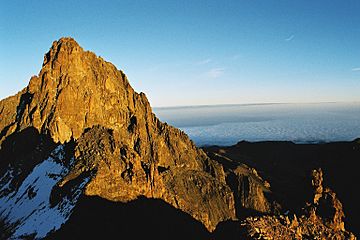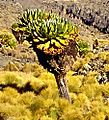Mount Kenya facts for kids
Quick facts for kids Mount Kenya |
|
|---|---|
 |
|
| Highest point | |
| Elevation | 5,199 m (17,057 ft) |
| Prominence | 3,825 m (12,549 ft) Ranked 32nd |
| Listing | Seven Second Summits Country high point Ultra |
| Geography | |
| Location | Kenya |
| Geology | |
| Mountain type | Stratovolcano (extinct) |
| Last eruption | 2.6–3.1 MYA |
| Climbing | |
| First ascent | 1899 by Halford Mackinder, with guides César Ollier and Joseph Brocherel |
| Easiest route | Rock climb |
Mount Kenya is the tallest mountain in Kenya and the second-highest in all of Africa. Only Kilimanjaro is taller! The very top parts of Mount Kenya are called Batian (5,199 meters high), Nelion (5,188 meters high), and Point Lenana (4,985 meters high).
This amazing mountain is found in Kenya, about 16.5 kilometers south of the equator. It's also about 150 kilometers north-northeast of Nairobi, the capital city of Kenya. Did you know that the country of Kenya is actually named after Mount Kenya?
Mount Kenya is a type of volcano called a stratovolcano. It was formed about 3 million years ago, after the East African Rift started to open up. Long, long ago, before ice covered it, the mountain was probably about 7,000 meters tall! For thousands of years, a huge ice cap covered it. This ice carved out the mountain, creating many valleys that spread out from the center. Even today, there are 11 small glaciers on Mount Kenya. The forests on the mountain's slopes are super important because they provide water for many people in Kenya.
Contents
Nature and Wildlife on Mount Kenya
Mount Kenya has different areas of plants and animals as you go from the bottom to the top. The lower parts are covered in various kinds of forests. Many unique plants and animals live only on Mount Kenya. These include giant lobelia plants, senecio plants, and a special type of rock hyrax.
A large area of 715 square kilometers around the mountain's center is protected as Mount Kenya National Park. In 1997, this park was named a UNESCO World Heritage Site. More than 16,000 people visit the park every year to see its beauty and wildlife.
Unique Plants and Animals
The plants on Mount Kenya have to be very tough. They are specially made to handle the big changes in temperature between day and night. For example, the Senecio keniodendron is a plant that has adapted to these extreme conditions.
Animals like Hyrax are also very good at living in this challenging climate. You can find them even at the highest parts of the mountain. In the forests, you might see Safari ants marching in long lines. They are easiest to spot when they cross the paths.
Water and Weather
The water that flows from Mount Kenya helps over 2 million people. The mountain's weather is affected by something called the Intertropical Convergence Zone. When this zone passes over the equator, Mount Kenya gets its wet season. During the dry season, mornings are usually clear and cool, but the mountain often gets hidden by clouds by midday.
Exploring Mount Kenya
People have been exploring Mount Kenya for a long time.
Early Explorers
An explorer named Joseph Thomson reached the lower parts of Mount Kenya. He helped confirm that the mountain was real, after it was first seen by Krapf. Later, in 1887, Count Sámuel Teleki was the first European to actually step onto Mount Kenya. His group climbed up to 4,350 meters high.
Climbing the Peaks
The first people to reach the very top of Mount Kenya were Halford Mackinder and his guides, César Ollier and Joseph Brocherel, in 1899.
There are many peaks on Mount Kenya that are popular for rock climbing. For example, Shipton and Russell were the first to climb Point John in 1929. Point Lenana is the third highest peak, and it's the one that most climbers try to reach.
Images for kids
-
Mount Kenya was a stratovolcano and probably looked similar to Mt. Fuji (shown above).
-
The central peaks of Mount Kenya are volcanic plugs that have resisted glacial erosion. (Left to right: Point Thompson (4955m), Batian (5199m) and Nelion (5188m))
-
Frost heaving causes patterned solifluction lobes below Mugi Hill.
-
The timberline forest is commonly in cloud. The trees are relatively small and covered in lichens and mosses.
-
Hyrax are able to cope with a more extreme climate and are found up to the highest elevation.
-
The Intertropical Convergence Zone affects Mount Kenya's wet and dry seasons.
-
Joseph Thomson reached the foothills of Mount Kenya and confirmed Krapf's discovery.
-
There are many peaks on Mount Kenya that require rock climbing.
-
Liki North Hut is a small bothy in the Liki North Valley. It offers little more than shelter from the weather.
See also
 In Spanish: Monte Kenia para niños
In Spanish: Monte Kenia para niños
 | Laphonza Butler |
 | Daisy Bates |
 | Elizabeth Piper Ensley |



































